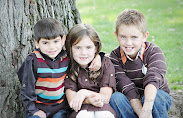We have the Attachment and Bonding course completed. Although we knew the following information, to see it in writing with numbers attached is sad. “In one study, it was estimated that by the age of 2 years, the child in a well-staffed orphanage has encountered 20 different caregivers; by 4 years, 40 caregivers and by 8 years, 80 different caregivers.” Keep in mind those statistics are for a well-staffed orphanage, not ones with high turnover rate which would be even worse.
The other topic of interest in this course that we have known about, but we still find relevant to us right now was the section on Indiscriminate Friendliness. “Indiscriminate friendliness is common among post-institutionalized children. Indiscriminate friendliness must be differentiated from sociability or gregariousness, also common in post-institutionalized children. Indiscriminately friendly children respond to any adult as long as their needs and wishes are met: one person can easily replace another. For children living in institutional care, indiscriminate friendliness has adaptive advantages. Seventy-one percent of parents of longer-institutionalized children described them as overly friendly; 90% reported little or no improvement in this behavior with time. It is possible that this behavior may have been reinforced by both parents and strangers early after the adoption. Children with more signs of indiscriminate friendliness were more likely to have been favorites in the orphanage, which suggests the adaptive nature of this behavior.” (information taken from the course)
We have been working with Blake on knowing the difference between the relationship he has with us vs. his relationship other adults. The text above is correct that early on when returning home this indiscriminate friendly behavior is reinforced. People love how friendly Blake is and they are drawn to him because he returns their friendliness. It is weird for us to have to be deliberate about teaching a child not to be so friendly. We usually spend so much time telling them to be nice, be kind, etc… Thankfully Justin and I have seen some breakthroughs lately with Blake, but there are moments still when he is overly friendly with some people and it makes us uncomfortable. We talk a lot about the difference between love and like. Early on there was an instance where we were walking through a parking lot. Blake asked a lady we do not know, “What are you doing?” Being kind the lady stopped and talked with us. Then Blake followed up with more questions that I can’t remember. When we had walked away, I simply asked Blake, “Why were you asking that lady so many questions?” His response was, "Because I love her." From that moment on, we have been much more intentional about dealing with the issue of ‘indiscriminate friendliness’. While it is counterintuitive for us to encourage him to put up barriers we know that this is in everyone’s best interest in the long run. We continue to make progress and this is positive. Of course this leads to another blog post for the future…. Apprehensions about adoption number two – trip number two – more about that later.
Subscribe to:
Post Comments (Atom)





1 comment:
Great information....we battle with that still...rebekah just recently has started telling us that she will just "leave home with one of those good guys she sees on the street".....got to love attachment disorders....YIKES!!!
Post a Comment